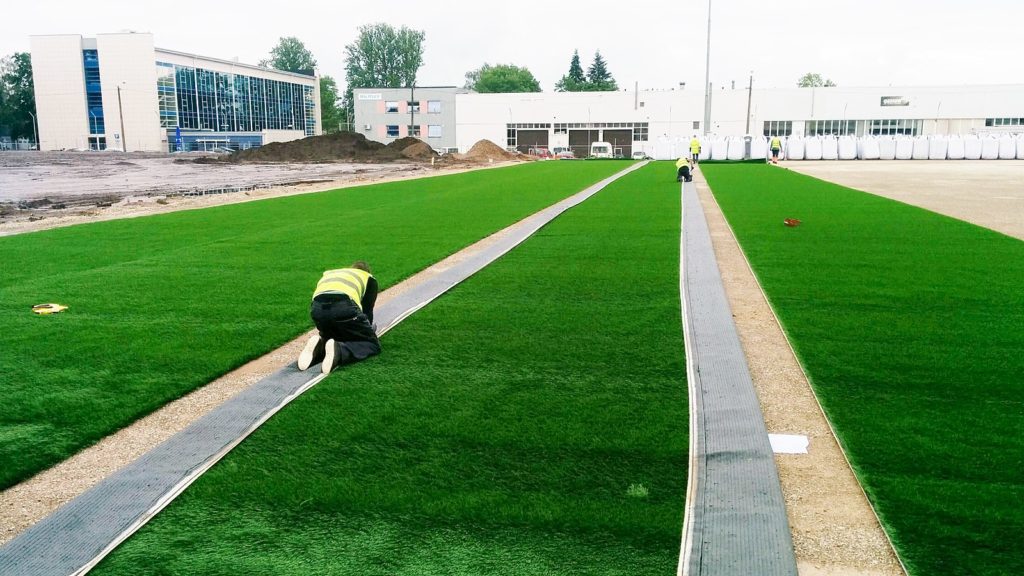Opinion: Correcting Inaccurate Reporting On The High School Track And Field Project

Installing synthetic turf. Photo: Wikimedia Commons
A recent article in the Daily Hampshire Gazette about the Amherst Regional High School track and field project contains numerous inaccuracies and unsubstantiated claims while also omitting critical information.
Here are some misleading and erroneous quotes from the article, followed by the facts:
- “$4.74 million project”
This figure was the cost estimate for an artificial turf project in 2021 dollars. Amherst Town Manager Paul Bockelman advised the Town Council that cost escalation to 2023 is approximately $5-6 million. This figure does not account for 1) the higher cost artificial turf products that are being promised in fundraising, 2) any further cost escalation that accrues while the project is delayed to seek funding for artificial turf, 3) purchase of specialized maintenance equipment for artificial turf, funding for testing of products and monitoring surrounding soil and water for contaminants and hazardous chemical runoff, and decadal recurring artificial turf disposal/replacements costs.
- “matching grant announced last week”
The fundraising report provided to the Regional School Committee (RSC) in January 2023 included a line item for a hoped for $50,000 from a “Local Bank” but that “need(ed) written commitment”. This amount was included in the funds that were required to be raised by January 2023. If this potential funding is the bank’s written commitment referenced by fundraisers, it should be named as such rather than implying that this is new, additional funding.
- “purchase a seat or row in the new stands that would receive a new plaque”
There is “no new seating or other comfort/storage facilities” included in the the project that was approved by the RSC. Neither the District nor the RSC have discussed or agreed upon any naming policy or change to their precedent against corporate sponsorship of District projects.
- “year-round playable field”
Artificial turf fields are not compatible with year-round play in our geographical region. At best, they may be able to be used from March to December but freezing temperatures negatively impact the safety of the field because of increased hardness, ice and snow removal significantly decreases their lifespan and requires specialized equipment that would need to be purchased, and hot weather precludes use as the surface reaches dangerously high temperatures.
- “close to the $2.2 million in community funds necessary”
The $2.2 million that was stipulated to be raised by January 2023 is not sufficient to pay for the artificial turf project. It would still be $1M short of the original 2021 estimate and ~$2M short of the inflation adjusted estimate for 2023. The $3.4M that has been secured would, however, cover the cost of a project that used a grass field instead of artificial turf (see citations above); an additional nearly quarter million dollars in CPA funds would also be possible if the project dropped artificial turf and used natural grass.
- “fallen somewhat short of a $331,000 goal”
In January 2023, fundraisers stated that they had secured $61,328 of the $331,000 necessary to reach the stipulated goal by that date. The balance was reported as “expected”, “commitment document received”, or “pending commitment document”. No proof or documentation was provided by fundraisers or sought by Amherst Public Schools administration for any of these figures. Failure to reach even 20% of the required funding goal is more than “somewhat short”.
Here is a list of what was NOT reported:
- All four boards of health of district member towns unanimously recommended against the use of artificial turf.
- Town Meetings in Shutesbury and Pelham have passed resolutions against artificial turf.
- Community Preservation Committees in Pelham and Leverett have denied funding because of the inclusion of artificial turf (the district withdrew its application in Shutesbury after a hearing in which all of the many public comments were in opposition to artificial turf).
- Hundreds of residents and multiple local environmental/climate groups have expressed opposition to artificial turf.
- There are several other concerns about artificial turf including increased injuries, microplastics and hazardous chemical exposures, and negative climate impacts
- Artificial turf has far higher initial and life cycle costs, twice that of grass fields.
- There is no plan for the recurring costs to replace and dispose of artificial turf every 10 years.
- ARPS policy KCDA cautions against accepting gifts that incur unfunded maintenance.
- Each discarded field contains many tons of non-recyclable plastic.
- The district has not and cannot guarantee the products and facilities being promised in fundraising materials.
- Neither the town nor the District owns the equipment necessary to maintain an artificial turf field.
- There are several bills making their way through the state legislature that would ban both PFAS and/or artificial turf.
A request has been made of the Daily Hampshire Gazette to publish a correction of the erroneous statements made and provide the omitted information. The press release, sent from the Marketing Communications Manager of bankESB, upon which this article was based can be found here. The Indy reached out to the ARPS administration and was told that “the district doesn’t have any comments regarding the article in the Gazette.”
